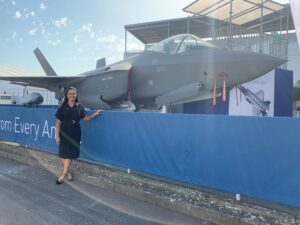Lockheed’s Preeya Lakhani: ‘Now is the dawn of the UK space age’
Inspired by TV shows like Star Trek and childhood visits to the Farnborough Air Show, Preeya Lakhani knew she had to work in the space industry. Today Preeya, 28, is Programme Lead for Space in the UK at Lockheed Martin and excited to be working during what she calls ‘the dawn of the UK space sector’, with technological developments gathering pace.
FINN’s Ben Griffiths spoke to Preeya about her ambitions for the industry and the advice she has for young people keen to follow in her footsteps.
What is your background in the space industry? Where did it all begin for you?
I always wanted to work in astrophysics. It was my parents who inspired me. My dad’s been taking me to Farnborough since I was four. I loved it. Every time I’d point out the fighter jets and want to know who made them. Lockheed Martin was one of those manufacturers and I wanted to know how to make one. So, my dad said: ‘Why don’t you go and work for them one day, so you can tell me!’
I did quite well at GCSEs but sixth-form college did not agree with my learning style. I later learned I have ADHD and I’m autistic. The college format didn’t play to my strength at all. I dropped out after a year. It was devastating because I had this dream to go to Imperial College London and study astrophysics.
I’d heard a bit about BTECs and if I did a level 3, I’d get the UCAS points to go to university. I went to Basingstoke College of Technology on a mechanical engineering course. I was the only female applicant. As they worked with some companies that offered apprenticeships, they asked if I was willing to interview.
My mum pointed out I could get a full-time job, which I got with Proctor & Gamble based in Reading working for Gilette razors. I spent two years training as a mechanical apprentice working in research and development with cutting edge equipment like 3D printers and things you wouldn’t even think a company like Gillette would work with.
That’s when I felt things were back on track and I could work in space.
I left P&G to join the Atomic Weapons Establishment, which at the time was 51%-owned by Lockheed Martin space. Things were starting to line up again. I did quite a few jobs at AWE, starting as an engineering technician, then a development engineer – using much the same equipment I used at Gilettte!
Then worked as technical adviser to the CFO. I had this absolute craving to know how the company worked and how business is run. I was starting to enjoy the leadership aspect of things. The deal was, he would teach me about finance and how to run a company. I would teach him about the ins and outs of our continuous at sea nuclear deterrent.
I always had one eye on what the space team was doing. It is small in the UK and very competitive but a job eventually came up for business operations lead. I did that for a year as a way in and to get to know the team and how LM works. As soon as an opportunity came up, I jumped for it.
What are your ambitions in the industry? Where do you want to go with this?
Being a programme manager is quite wide. You can do smaller projects and keep expanding. Eventually I would love to be managing programmes in the civil side, like human space travel, Mars projects or Artemis. I love working for LM and I’m very happy where I am. I am already living the dream. There were so many times I thought wasn’t going to happen, so the only way is up. Some 400 of my team are in the US, so we are leverage the incredible track record and rich history of LM in the US as we strive to establish that here in the UK. For at least the next five years we’re part of a picture where we’re growing the UK space sector by developing skills and establishing academic connections. I want to see the UK become a bigger part of the picture. When I wanted to work in space when I was a kid it was all about Nasa. What about us? We are becoming part of this now and it’s an exciting time. It’s like the dawn of the UK space age.
What’s your best memory around space? What would you tell your grandchildren about?
Being part of strengthening your nation’s defence is unreal. I’m hoping that, in years to come, there’ll be a definitive ‘yes, I did that’ for the space industry. Being able to understand our sector and what we do and develop so the people who are out there fighting to protect our nation have reliable service and are safe because of Satcoms. That’s incredible to say you work on that.
What’s your best advice for younger people thinking about following in your footsteps?
No one path will be the same as yours. Life doesn’t always happen in the order you want. But never lose focus on your dream. Everything you do is aligned to your dream and you have to keep seeing it that way. Even something as simple as consistently waking up at the same time each morning, reading a book each day or working in an industry you’re not passionate about. What you see as valuable to achieving your dream may not be via the same lens an employer is looking through! Sometimes, it may seem pointless or not the path you imagined but it’s working towards your dream.
I learned that when I read Chris Hadfield’s book ‘An Astronaut’s Guide to Life on Earth’. He aligns all of his experience as a fighter pilot and astronaut to what you experience day-to-day and how lessons you’d learn in the crazy career path he had show everything falls into place. It’s something I wish I could tell my younger self and that this seemed unrealistic at the time.
Do you have any heroes or idols from the space sector, past or present?
Christina Koch, the female American astronaut who is incredible. I can’t comprehend this woman and what she has achieved. She is going to be on the manned Artemis missions. Her path is incredible. How did she get there?!
Another female leader is Stephanie Hill. She is one of our executive vice presidents in LM. From a leadership perspective and seeing her as a leader of a major defence contractor, the panels she’s on and speeches she gives. She’s inspiring, passionate and driving a huge organisation to wards their mission. To be able to do that is such an incredible skill.
What inspires you about this sector and the people in it?
This is a really critical time for the UK Space sector. To me, everyone who I have met in the space sector is so nerdy about it. They love it. They share my passion. They all work to the same mission. We’re in this industry because we had that passion as kids; we have a vision of what we want the UK space sector to look like. Everyone cares so much. There is a passion for the mission. For my parents, who’re first generation immigrants and worked very hard to establish themselves in the UK, they weren’t living to work, they were working to live. Their view was work hard and have a nice future. I thought that’s what the working would be like, but instead I’ve found this sector we truly love and care about. We care so much about expanding the UK space sector and to be surrounded with people like that is incredible.
I’ve never encountered any sexism or ageism or people who do not want to adapt. Everyone has been so welcoming and inclusive. It’s been refreshing and a great industry so far.
What does success look like? How will you know when you’ve got there?
We all have a dream of what it looks like. Seeing the UK space sector expand, bringing manufacturing and R&D to the UK. Leveraging that at least 50-year atcom heritage to the UK and seeing schools and universities teaching more about space to unlock that for the UK would be a brilliant picture. But quite honestly the bar keeps moving. Technology keeps developing. Academia keeps coming up with new ways to raise that bar. There is no pinnacle. It keeps moving. That’s the beauty of this industry.
Subscribe to the FINN weekly newsletter

















